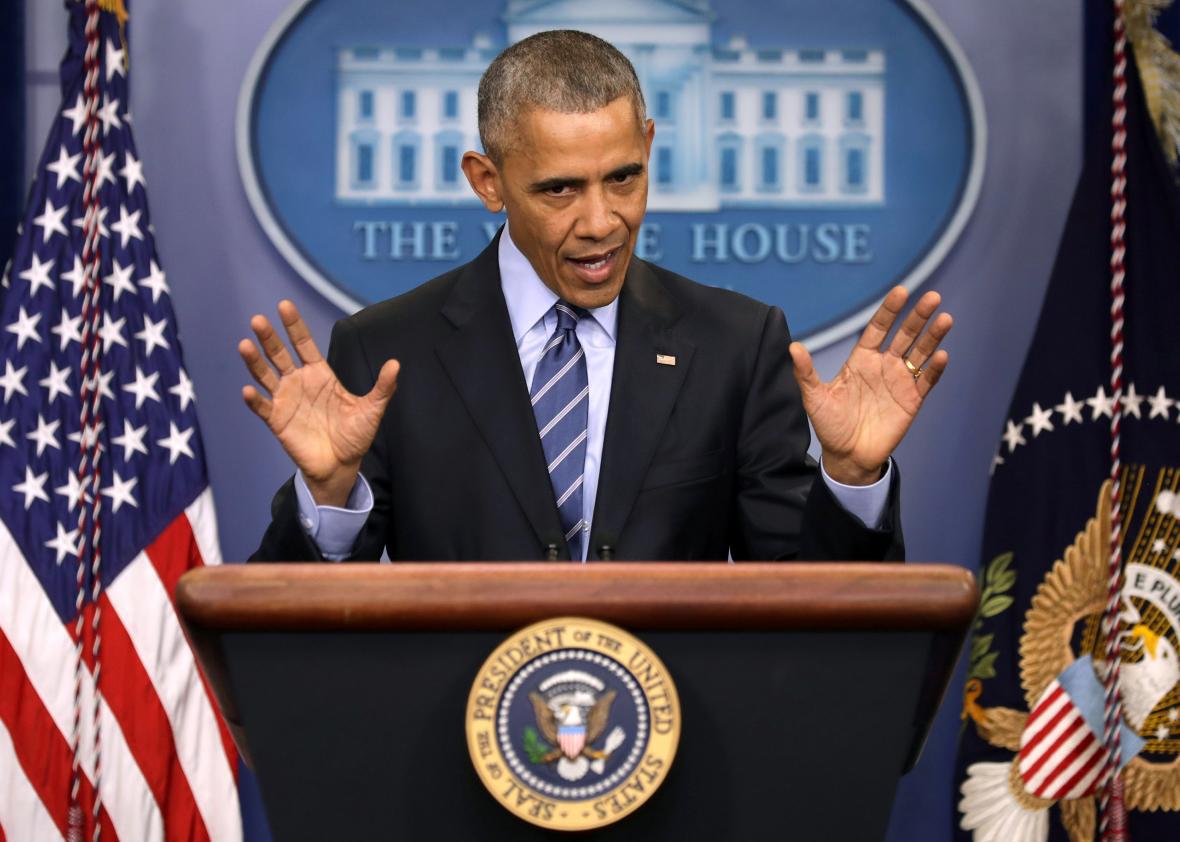There was a plenty of blame to go around in Barack Obama’s melancholy final press conference of the year on Friday.* But he reserved some of his most trenchant criticism for the American political press. Whether or not the media is the villain most deserving of his public contempt right now, Obama’s critique was insightful—and largely valid.
Speaking on the same day the Washington Post reported that the FBI had joined the CIA in concluding that Russian state-sponsored hackers worked to help elect Donald Trump, Obama suggested that the U.S. media were at least as much to blame as the Russians themselves.
The leaks of Hillary Clinton campaign chair John Podesta’s emails, Obama said, became in the media’s hands “an obsession that dominated the news.” He suggested that major media outlets’ newfound outrage at the latest charges of Russian meddling was disingenuous, because they had reported all along that there was evidence Russia was behind the hacks—but continued to gleefully dissect and distribute their content on a daily basis.
Meanwhile, Obama argued, the groundwork for the success of the political hoaxes that have come to be called “fake news” was laid by hyperpartisan conspiracy-mongers on the U.S. media’s fringes, especially the rightward fringe. He said:
If fake news that’s being released by some foreign government is almost identical to reports that are being issued through partisan [U.S.] news venues, then it’s not surprising that foreign propaganda will have a greater effect. It doesn’t seem that far-fetched compared to some other stuff folks are hearing from domestic propagandists.
To the extent that our political dialogue is such that everybody’s under suspicion, everybody’s corrupt, everybody’s doing things for partisan reasons, and all our institutions are full of malevolent actors—if that’s the storyline that’s being put out there by whatever party’s out of power, then when a foreign government introduces that same argument with facts that are made up, voters who’ve been listening to that stuff for years, who’ve been given that stuff every day from talk radio or other venues, they’re going to believe it.
If we want to really reduce foreign influence on our elections, then we better think about how to make sure that our political process, our political dialogue, is stronger than it’s been.
Lest anyone think this was a mere digression or pet peeve, Obama returned to his criticism of the media and public discourse in his closing thoughts:
I do hope that we all just take some time, take a breath … to just reflect a little bit more about how can we get to a place where people are focused on working together based on at least some common set of facts?
An ungenerous reader of Obama’s remarks might conclude that he would rather gripe about the media than aggressively stand up to the hostile foreign power that manipulated it. Certainly the tone of his remarks—by turns didactic, exasperated, and quietly resigned—lends itself to the criticism that he’s responding weakly to Russian meddling. To be fair, we can’t know at this point just how weak or strong Obama’s ultimate response will be, because any retaliation is being planned and carried out in secret.
Leaving aside Obama’s tone and posture toward Russia, however, his critique of the media has some merit—especially when it comes to his diagnosis of the fake-news problem.
He rightly separated his criticisms of the mainstream and fringe media, which played very different roles in this year’s election coverage. The former’s complicity in publicizing the leaks is apparent, and it’s understandable that Obama would be frustrated by it. Many in the media are frustrated by it themselves, although exactly what they should have done differently is not obvious: Ignoring or downplaying the leaks would have amounted to a different kind of irresponsibility. What Obama didn’t mention is that public trust in the mainstream media has eroded in part due to perceptions, fair or not, that it routinely evinces a liberal bias. Even if the largest outlets didn’t report on the leaks, plenty of others would have—and conservatives’ mistrust of mainstream media would have only grown.
In fact, it’s this very mistrust that has helped give rise to the latter problem Obama identifies. That’s the problem of the right-wing blogs and conspiracy sites whose wild claims and speculations helped pave the way for millions of Americans to fall for outright hoaxes, such as a series of viral stories claiming that Clinton had been found guilty of various crimes. I’ve argued before that the problems of fake news, propaganda, and conspiracy theories are distinct, and require different solutions. But Obama points out that their relationship is symbiotic: Where conspiracies and hyperbole flourish, fake news is all the easier to believe.
One surprise in Obama’s remarks about fake news was his repeated implication that much of it was the work of a “foreign government.” We know that several fake news sites originated in Macedonia, but reports have suggested they were motivated primarily by profit, not politics. A Washington Post report linking fake news to “a sophisticated Russian propaganda machine” has been criticized as unsubstantiated, and the Post added an editor’s note qualifying the story and noting that it can’t vouch for its subjects’ central claims. Did Obama make a mistake in implicitly attributing fake news to Russia despite those seemingly valid doubts as to its role—or does he know something we don’t?
*Correction, Dec. 17, 2016: This post originally misidentified the press conference as Obama’s final one as president. It was his final press conference of 2016.
